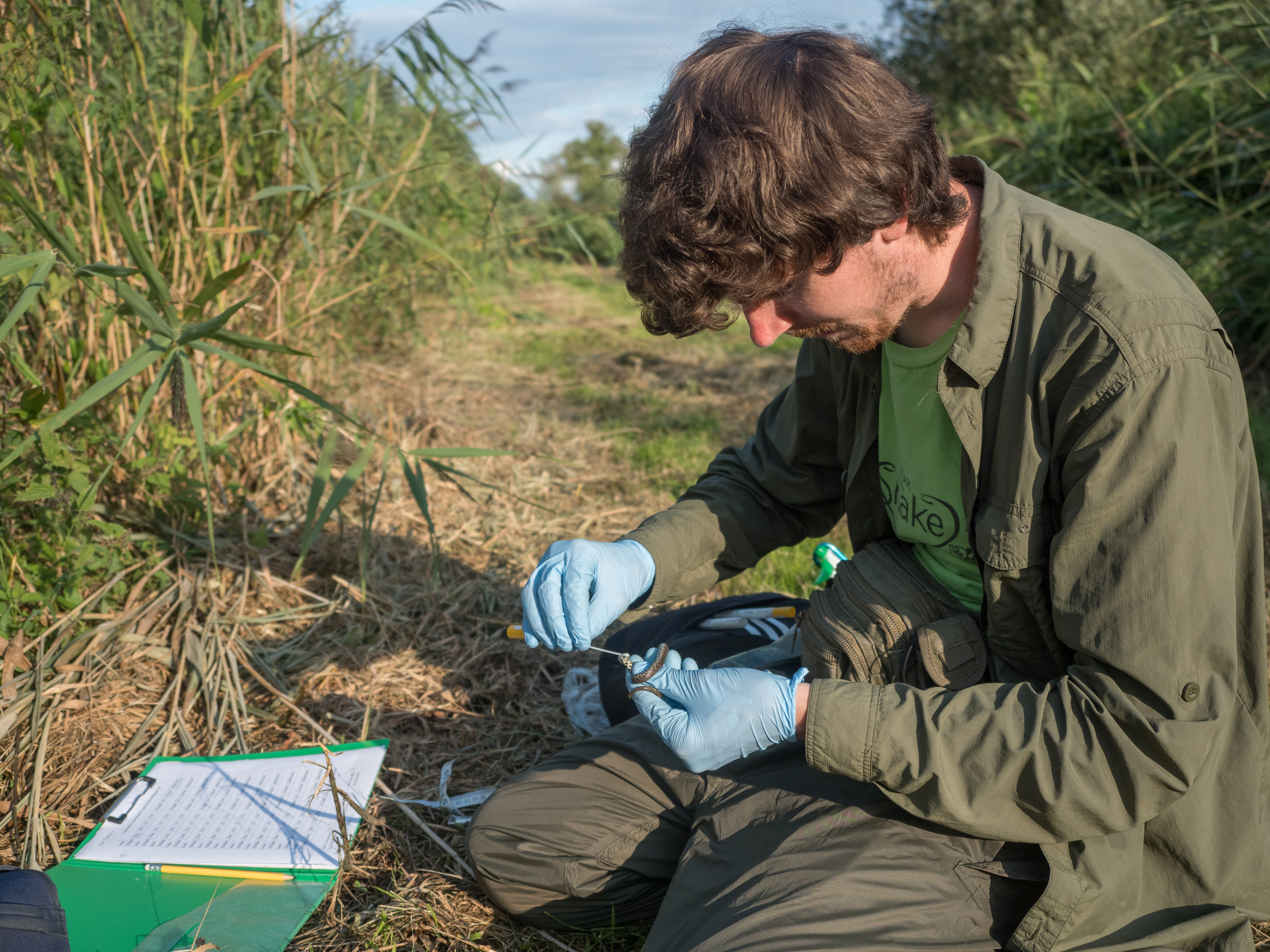Steven Allain – winner of the 2022 NBN Award for Wildlife Recording, has been researching a population of grass snakes in rural Norfolk and how they are affected by an emerging infectious disease which infects their skin, called ophidiomycosis. By studying a Research degree, Steven has built the confidence and skills to be a successful scientist and aims to pursue their research even further in an academic institution or a non-governmental body after their studies.
Why did you choose to study a PhD?
I chose to study a PhD as it felt like the natural progression, following my Master’s degree (which I completed elsewhere). I have always been an inquisitive person, but for me six months was not enough to be able to really get my teeth into a more substantial research project. I barely felt like I had scratched the surface, and therefore was on the hunt for something bigger to keep me occupied for the foreseeable future. I am also extremely passionate about amphibians and reptiles, so the chance to study them at the PhD level had always been a possibility, sitting in the back of my mind.
How did you learn about Postgraduate Research opportunities at Kent?
I found out about this particular opportunity through FindAPhD, although I had been aware of other opportunities in the past via the Kent website, and enquiries I had made with my primary supervisor ahead of applying for my current PhD.
How did you choose your supervisor?
Thankfully, I had been in touch with my supervisor ever since working on my undergraduate dissertation (on great crested newts) and had met them a few times at various conferences around the country. When the opportunity then came up to work with Prof Richard Griffiths on this project, I jumped at the chance and quickly got my application in. I am aware this is not the way that most people pick a supervisor, but I was fully aware of Prof Griffith’s expertise in my desired research area, so even if I did not have a previous professional relationship with him, I would have likely ended up studying at Kent under his supervision anyway.
What was your application process like?
The application process was quite straightforward. I just had to fill out an online form for both the University, and my doctoral training partnership. These included such information as which degrees I held, what my academic ambitions were, and why I wanted to study at the postgraduate level. Thankfully, these required very similar information so copy and paste was my best friend! Once I had submitted them, it was only a matter of waiting to hear whether I had been shortlisted for the position or not.
Tell us about your research?
How long have you got? For the past four years, I have been studying a population of grass snakes in rural Norfolk. I am particularly interested in how the snakes are affected by an emerging infectious disease which infects their skin, called ophidiomycosis (also known as snake fungal disease). Ophidiomycosis was first confirmed in wild snake populations in Great Britain in 2016, and it has been my goal to try to characterise the clinical signs associated with infection and establish the prevalence in my study population. As you can imagine, this has involved running around catching snakes for three summers, which is easier said than done! They are not everyone’s cup of tea, but science communication is close to my heart, and I hope by me championing grass snakes and their conservation through my research, more people will care about them.

Has your PhD helped your career prospects?
Almost certainly. My PhD has helped to develop my research and writing skills, while also giving me the confidence and ability to be a successful scientist within my respective field. I am also lucky enough that I have been able to travel to two international conferences (despite the COVID-19 pandemic) in order to present my research. This has aided in my networking and helped to launch my career on a stage outside of the United Kingdom. If you are a postgraduate student, I’d recommend visiting an international conference or two so that you can do the same!
What do you want to do in the future?
Ideally, I would like to stay within research. Whether this is as part of an academic institution or a non-governmental body, I do not mind. I just love being out in the field and collecting data come rain or shine. There is no better feeling than being immersed in nature and experiencing it in all of its splendour. On the flip side, I also enjoy spending time in the lab. Once you’ve established your perfect pipetting playlist, you can get into the perfect rhythm that allows you to quickly complete the most insurmountable of tasks. As long as I am involved with one of these two aspects that have been part of my life for the past 4 years, along with the necessary research and writing, I will be extremely happy.
What advice would you give to a prospective student considering Postgraduate Research?
The first thing you need to do is to do a little bit of research. Is Kent the right place to study what you intend to, and is there a member of academic staff that could act as a supervisor? It is important to reach out to potential supervisors as early as possible, in order to start building that professional relationship. Whether you are a current undergraduate student or studying elsewhere, the earlier you reach out, the better. Those potential supervisors may also be able to inform you of other potential funding streams that are better suited to your particular field or speciality. Best of luck!
Steven Allain is a Conservation Postgraduate Research student at the University of Kent.

Photo credit to Neil Phillips.

